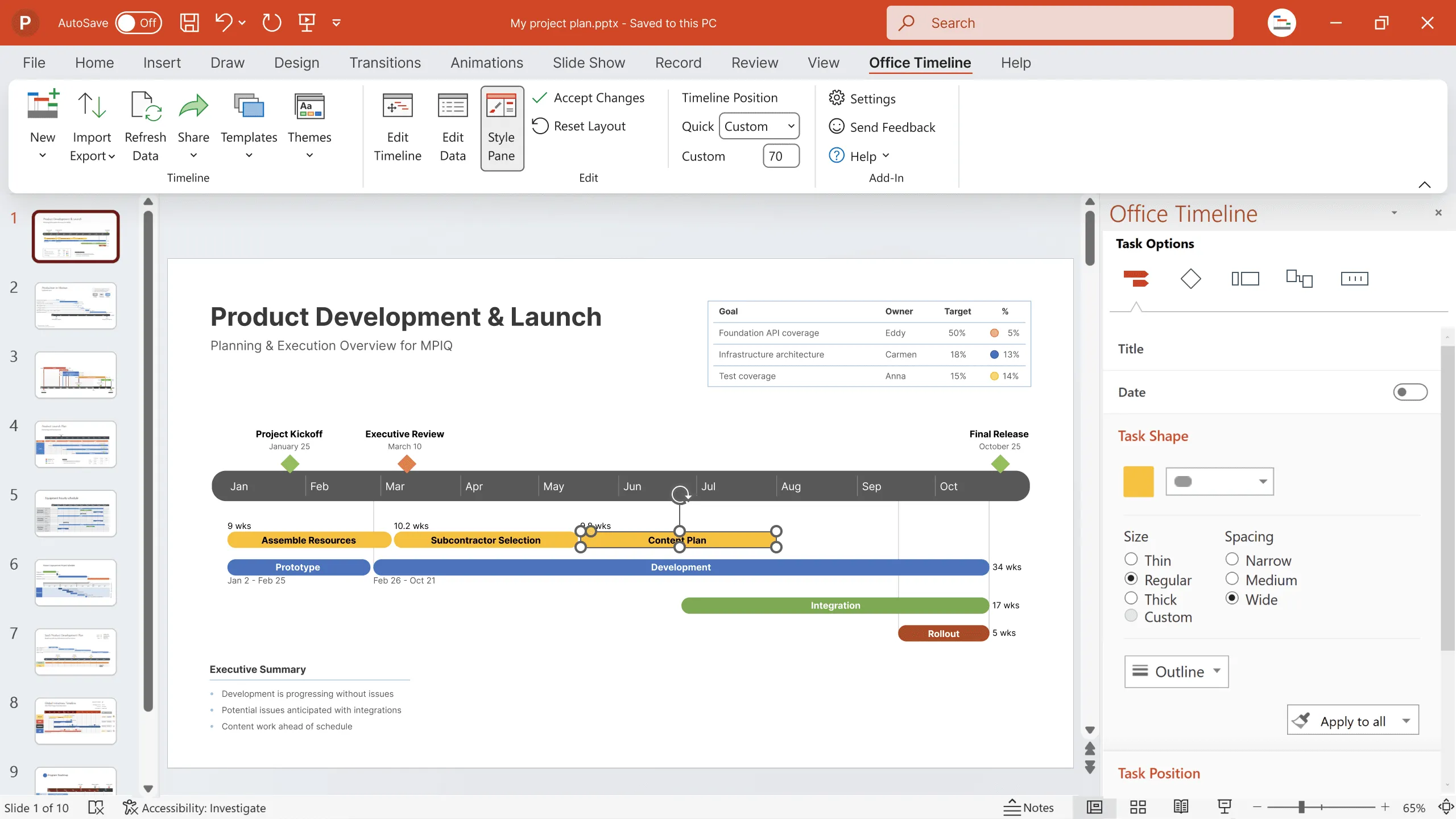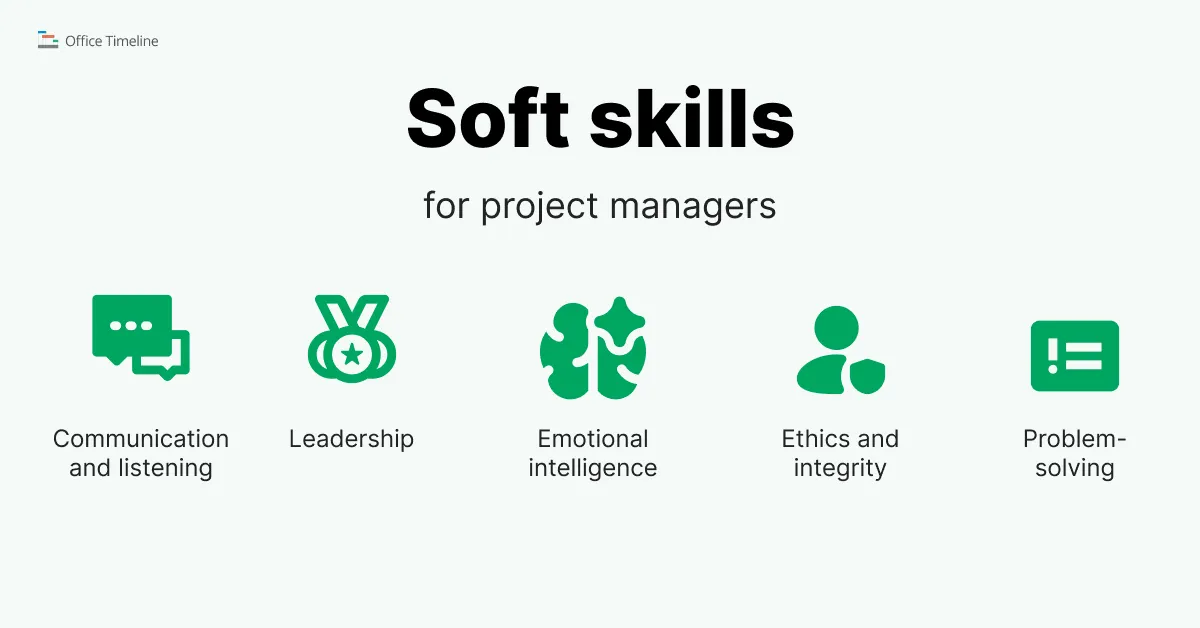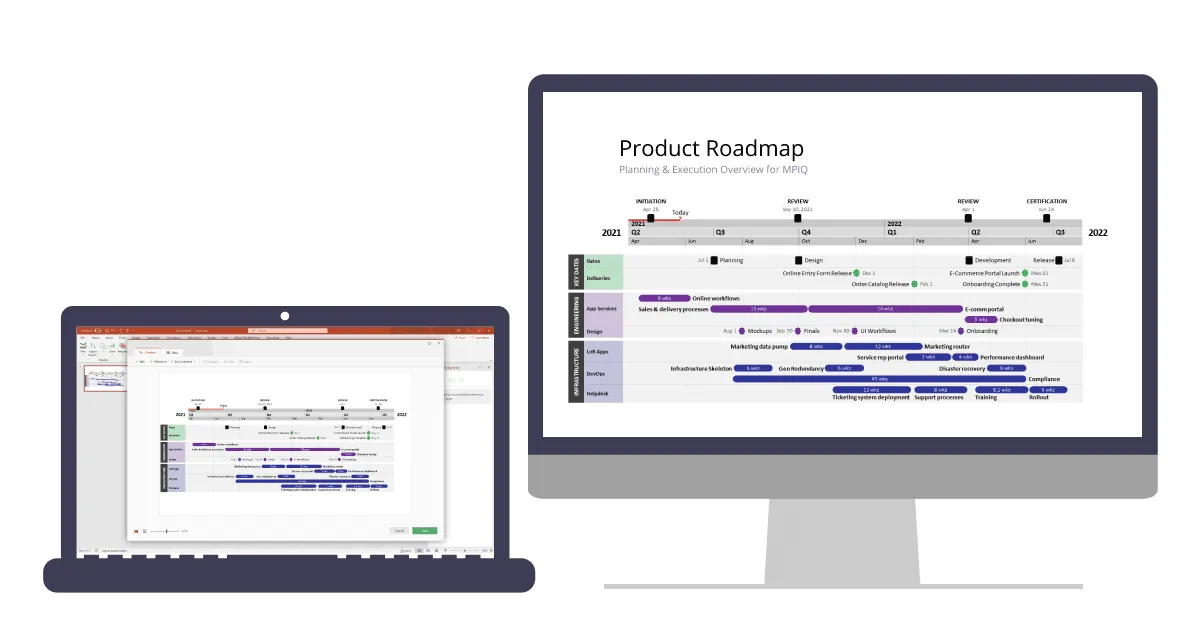5 must-have soft skills for project management
Find out what are the top project management soft skills needed for the successful delivery of any project
Last updated: March 27, 2024
In project management, success is directly tied to mastering soft skills. Yet, is this common knowledge? Aspiring project managers work very hard at getting relevant technical certifications and advanced degrees to show their proficiency. But excellent credentials are just one side of the story of a competent project manager – the side that relies on hard skills. The other side is built on soft skills, also known as people skills.
What are soft skills in project management?
Soft skills are the non-technical, interpersonal abilities that help leaders work well with the stakeholders involved in a project. They are all about the way you communicate, work in a team, get along with everyone involved and how you adjust to change and solve difficult problems.
Why are soft skills essential in project management?
The role of a successful project manager is to lead the team towards achieving the project’s goals and meet stakeholders’ needs while balancing constraints and available resources. In managing conflicting project goals, the project manager uses interpersonal abilities and people management skills to reach an agreement among stakeholders.
“Research shows that successful project managers consistently and effectively use certain essential skills. Research reveals that the top 2% of project managers as designated by their bosses and team members distinguish themselves by demonstrating superior relationship and communication skills while displaying a positive attitude.” (The PMBOK Guide, Project Management Institute)
For an aspiring project manager, the lack of soft skills can be a real issue. Soft skills, being less easily teachable, hold greater value. Studies in resource management found that the top three critical skills for successful projects include technical project management, leadership, and strategic business management. Although many organizations struggle to find individuals with sufficient technical project management skills, they believe these skills can be taught. Thus, they prioritize hiring people with strong leadership skills, aiming to develop their technical and strategic abilities later, through training.
What should every project manager know about soft skills?
- Soft skills help project managers work well with their teams and others involved in the project. How? By improving communication, collaboration, and building trust.
- Soft skills are personal qualities. They are inherent characteristics of an individual’s personality rather than technical or job-specific skills.
- Unlike hard skills, which are specific and measurable, soft skills are more difficult to quantify and harder to acquire but are equally important for the good progress of a project. For example, empathy is important in understanding stakeholders’ points of view in the process of stakeholder analysis. This translates in smoother interactions and better solutions to problems. Assessing empathy involves observing how managers listen to team concerns, offer support, and consider viewpoints in decision-making.
- Although difficult to teach, soft skills can be developed over time through practice and experience.
- Employers consider soft skills when reviewing resumes during the hiring process. Though harder to assess, they do this through interviews, behavioral assessments, and situational judgment tests. Things like poor communication, lack of teamwork abilities, incapacity to solve problems, or resistance to change could send you right off the list of candidates.
What are the five most important soft skills for project managers?
Project managers focus on mastering technical expertise or organizational skills. But sometimes they don’t prioritize the development of soft skills that have a direct impact on a project’s development.
These are some of the soft skills that project managers can’t do without:
- Communication and listening
- Leadership
- Emotional intelligence
- Ethics and integrity
- Problem-solving
Let’s break down each of these skills and see how they contribute to a project’s success.
1. Communication and listening
Developing a consistent, clear and proactive communications style is a “must do.” The ability to communicate anything about the project – plans, ideas and reviews – to anyone related to the project – staff, clients, partners and executives – in a way where you are heard, understood and recognized is critical for the success of your project.
1.1. Adaptive communication
Adaptive communication means adjusting how you talk, act, and what you say depending on your situation and audience. Recognizing that not all audiences are the same and being able to adjust communication styles and content to deliver the appropriate messages to the right audience at the right time are valuable and important soft skills for project managers. Failing to adapt communication styles may compromise a project manager’s ability to influence executives, collaborate with partners, or coordinate cross-organizational teamwork.
For example, executives prefer a high-level summary in project reviews rather than project management-level details. And vice versa, project staff require detailed project reports rather than operating solely on high-level summaries. Project managers who understand the needs of each audience will be mindful of how to communicate effectively with them.
Being proficient in adapting communications requires project managers to:
- be aware of what is most important to the colleagues, staff, clients, partners and execs with whom they are communicating;
- flex their communication styles on the fly to meet the needs of their target audiences;
- be competent with multiple communication vehicles and match the most efficient medium for each audience;
- anticipate potential triggers for their audience and be prepared to address difficult discussions;
- listen attentively, without bias, and remain open to feedback.
The good news is that communication skills can be trained through various methods such as workshops, courses, and coaching sessions. Additionally, the communication process can be enhanced by aiding tools such as presentation software, collaboration platforms, and visual tools. Project visuals such as charts, roadmaps, diagrams, and images help simplify complex data, engage the audience, and aid information retention.
Additionally, visuals emphasize key points, making communication more impactful and memorable. These tools make information sharing so much easier, helping people work better together and save project managers a great deal of time and effort.
1.2. Listening
What? Yes, listening is on our list. Listening is key to effective communication. Good communication relies on focused listening, clear expression, understanding others’ perspectives, interpreting nonverbal signals, and providing feedback.
Focused listening is a powerful skill in project management, yet more challenging than it seems. Busy project managers may not prioritize this every day. It requires disciplined effort and strong intention. Deep listening helps project managers build trust and detect unanticipated risks early. Practices for project managers include:
- Going into discussions prepared to listen without distraction.
- Applying patience by not interrupting others and pausing before responding.
- Avoiding making assumptions or jumping to conclusions.
- Asking probing questions that enrich the discussion at the right moments.
- Being aware of what may purposely not be communicated and why.
2. Leadership
In project management, leadership is about guiding and inspiring team members towards project goals. It involves making decisions, providing direction, managing people and resolving conflicts to ensure project success while taking responsibility for outcomes. Charismatic leaders inspire trust and empower their teams. Leadership is not always about being in a formal leadership position; it can also involve leading by example or influencing others in a diversity of environments – from work to community involvement.
Good leadership needs soft skills – a great deal of emotional intelligence, ethics, and integrity. A good project manager also:
- relies on collaboration understanding its huge role,
- provides support and requires feedback,
- ensures that everyone understands their responsibilities, but also that everyone’s needs and points of view are heard and understood.
2.1. People management
Strong leadership guides teams towards achieving project goals while effective people management ensures the well-being and productivity of team members. And, as we know, the key to delivering projects successfully is the people on the project team. Beyond the project team, a project manager will also need to be engaged with outside contributors, stakeholders and other people related to the project. Managing all the people involved in a project requires project managers to draw on some of the mentioned soft skills such as self-awareness, empathy, good communication, and building trust-based relationships. The project manager’s mission, to drive projects forward successfully, means managing people – managing up, managing down, managing laterally and managing beyond the organization.
To develop people management skills, here are 12 strategies project managers can focus on:
- Always stand up for your team.
- Clearly communicate the project vision and its goals.
- Inspire and motivate others to secure their commitment.
- Keep people focused on the main goal.
- Create an environment where people can collaborate easily.
- Provide support by removing barriers others may have.
- Be personally engaged with all people involved in the project.
- Share information transparently and welcome feedback.
- Maintain a positive attitude. Refrain from any complaining.
- Handle personality differences by directing focus towards task achievement.
- Customize motivational strategies to individuals’ needs.
- Manage up openly and often to avoid surprises.
3. Emotional intelligence
In the enterprise, this soft skill describes a project manager’s self-awareness, their social awareness and their relationship awareness. Broadly speaking, this means the ability they have to recognize their own emotions, as well as the emotions of others contributing to the project. It is on our “must-have” list because it includes the skill of regulating emotions appropriately, at the right time, so project managers can handle challenging situations calmly and objectively. Developing this soft skill will empower project managers to:
- Find common ground and build trust more easily with project team members and stakeholders.
- Understand the emotions of team members more accurately and empathize with them.
- Anticipate team dynamics by observing verbal and non-verbal interactions among team members.
- Be open and adaptable to internal and external changes by staying focused on the big picture.
- Be aware of personal stress and the stress of the team and be mindful of how this impacts productivity.
4. Ethics and integrity
Of course, ethics sounds like a no-brainer on any list. However, in the project world, being honest about intentions, consistent transparency, accountability, and reliability in delivering commitments are hugely important things. Every project manager is essentially a leader, and integrity is a highly valued leadership quality in the enterprise.
Project managers not only represent the projects they work on but also the company to clients, executives, and partners. For project managers, developing muscle around ethics and integrity also strengthens their personal brand within the team, and importantly, with management and customers. Personal qualities related to honesty, trustworthiness, and moral principles are essential for maintaining ethical standards and building trust within a team and with stakeholders.
Here are some focus areas for project managers who want to strengthen this soft skill:
- Accountability for keeping and delivering commitments you made.
- Keeping actions consistent with your principles.
- Taking on tough issues directly and honestly, especially when things go wrong.
- Establishing a proactive communication process that is fiercely transparent.
- Consistently making decisions fairly, without favoritism or prejudice.
- Taking ownership and responsibility of the end result without shifting blame.
5. Problem solving
Problem solving is the process of finding solutions to challenges. It implies identifying and addressing challenges that arise during the course of a project and using methods and techniques to find appropriate solutions. This process involves logical approaches and skills such as critical thinking and creativity.
These are the steps, the methods and the skills involved in the problem-solving process:
- Understanding and defining the problem. Project managers should be able to recognize different types of problems that can occur during a project, whether technical, interpersonal, or organizational. For example, technical problems may involve software glitches or equipment malfunctions; interpersonal issues could include conflicts between team members; organizational challenges might arise from changes in project scope or budget constraints.
- Identifying the root causes. It is important to go deeper and identify the underlying causes of a problem rather than just treating the symptoms. This is when project managers use their analytical skills to look at what factors underlie the current problem, why they exist, and how they appeared.
- Generating possible solutions. That is, considering multiple potential ways to address the issue. And here, creativity and collaboration are put to work. A good project manager encourages innovative approaches and thinking outside the box to find unique solutions alongside conventional ones. Also, input from various stakeholders can be of great help. When project managers encourage open communication and teamwork, a diversity of perspectives and insights are revealed, which help generate diverse solutions.
- Choosing the best solution. This is when project managers have to select one from many solutions that all have their own plus points and faults. Project managers use their decision-making skills to select the best course of action to address the problem. This involves weighing the available options, considering the potential risks and benefits, and making an informed decision in a timely manner.
- Checking on the solution’s effectiveness. The project manager checks to see whether the solution solves the problem. In this step, the project manager’s analytical skills are put to work to evaluate the impact of the solution. Additionally, communication skills are a must – the project manager must convey their findings to stakeholders. And last, but not least, the project manager needs collaboration skills to work with the team on potential adjustments or improvements.
Conclusion
Project success relies on a combination of hard skills and soft skills, with soft skills being indispensable for effective project management. Unlike hard skills, soft skills are difficult to teach and therefore they can be challenging to master. Some project managers may naturally possess these skills, while others may need to learn them.
Learning soft skills starts with awareness and requires practice and a willingness to grow. By observing others who excel in soft skills and practicing consistently, project managers can enhance their abilities and become better leaders.
Frequently Asked Questions about soft skills in project management
In our exploration of relevant aspects related to soft skills in project management, we've found answers to some of the common questions people have about soft skills.
Soft skills are interpersonal abilities that are required for effective team collaboration and communication. They include leadership, teamwork, adaptability, emotional intelligence among others. Project managers use these skills to create and maintain positive relationships with team members and clients, and find solutions to challenges. Soft skills complement hard skills, like technical expertise, and play an equally important role in project success.
The three most important soft skills of a project manager can be considered:
• Leadership. A good project manager inspires and motivates their team, provides guidance and direction, and leads by example.
• Communication. Project managers must have strong communication skills to transmit information clearly and listen to stakeholders’ needs and concerns.
• Problem-solving. No project is a simple project. Project managers are confronted with many challenges throughout a project’s lifecycle. They need to analyze problems, identify solutions, and make decisions efficiently.
Yes, empathy is considered a soft skill. It involves the ability to understand others’ feelings and perspectives. As project managers handle complex tasks involving a diversity of people, the ability to empathize proves highly valuable.
In project management, empathy helps build strong relationships and improve teamwork. It is a great booster of effective communication with the stakeholders – team members and clients. By connecting with people on a deeper level, a project manager can anticipate their needs, and find the appropriate response to their emotions and concerns.
No, Scrum Master is not a soft skill. Scrum Master is a role within the Scrum framework, which is a specific agile methodology used in project management.
Soft skills refer to personal attributes and interpersonal abilities such as communication, leadership, teamwork among others. The role of a Scrum Master mainly involves facilitating Scrum events, removing impediments, and ensuring adherence to Scrum practices. While the Scrum Master role relies on soft skills, being a Scrum Master itself is not a soft skill.
Project management tips and tricks
Turn project data into professional timelines
Get the advanced features of Office Timeline free for 14 days.





